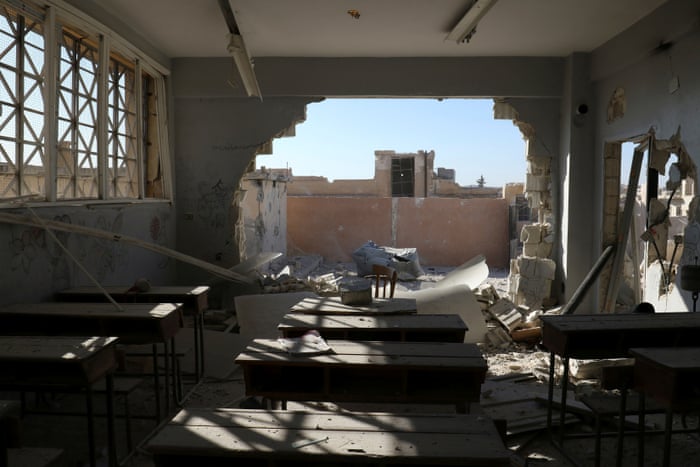
A shell-damaged classroom in Hass, Idlib province, Syria. More than 530,000 Syrian children in Lebanon, Turkey and Jordan were out of school at the end of the 2016-17 year, researchers said. Photograph: Ammar Abdullah/Reuters
Millions of dollars pledged by world leaders to get more Syrian children into school failed to reach them, arrived too late or could not be traced due to poor reporting, researchers have claimed.
After tracking pledges made at last year’s London conference for Syria, Human Rights Watch said there were “large discrepancies” between the funding donors said was given to education and the amount that reached the intended target.
The conference, attended by Angela Merkel, the German chancellor, David Cameron, the British prime minister at the time, and John Kerry, the former US secretary of state, was hailed as a triumph, raising more money in a single day than any previous fundraising push.
Millions of dollars pledged by world leaders to get more Syrian children into school failed to reach them, arrived too late or could not be traced due to poor reporting, researchers have claimed.
After tracking pledges made at last year’s London conference for Syria, Human Rights Watch said there were “large discrepancies” between the funding donors said was given to education and the amount that reached the intended target.
The conference, attended by Angela Merkel, the German chancellor, David Cameron, the British prime minister at the time, and John Kerry, the former US secretary of state, was hailed as a triumph, raising more money in a single day than any previous fundraising push.
No country achieved this goal, HRW said. By December, 530,000 children – almost one-third of the 1.48 million Syrian refugee children – were not receiving any education.
The six largest donors told HRW researchers that, in 2016, they had made available education funding of more than $1.5bn for Syria and the region.
But reports on the amount of funding given and received differed significantly, researchers said. Lebanon and Jordan received substantially less education funding than donors had promised.
Much of the money that was sent did not arrive until after the start of the school year, too late to enrol the children it was intended to help. In some cases, donors had double-counted the promised funds, said HRW.
Only Germany, which provided $249m (£187.7m) and the UK, which provided $81.8m for education, published figures matching the sums reported to HRW.
A lack of transparent and consistent reporting means it is often impossible to determine how much a host country has received or can expect to receive.
“Despite global concern about Syrian refugee children, it is still impossible to find answers to basic questions about whether their key educational needs are being met,” Rau said. “Donors should fix the transparency deficit that is undercutting their own support for Syrian children, who cannot afford to wait any longer to get back into school.”
He concluded that more detailed information was needed to determine whether donors met targets, provided aid in a timely way and whether activities being funded addressed key obstacles that were hampering education for Syrian children.
“Clarity about aid can help pinpoint the reasons why, despite donor support, hundreds of thousands of Syrian children still lack access to education,” the report said.
Donors agreed to provide $250m for education in Jordan and $350m for education in Lebanon in 2016, and agreed much of the aid should be delivered before the school year began, so that teachers could be hired, books could be bought and student intake planned in advance.
But by the start of the school year, Jordan had only received 31% of promised funding, while Lebanon just over half.
HRW has reported on the obstacles to education in the three host countries, including policies that make school-related costs unaffordable to refugees and add to pressures on children to work or marry.
[“Source-theguardian”]






